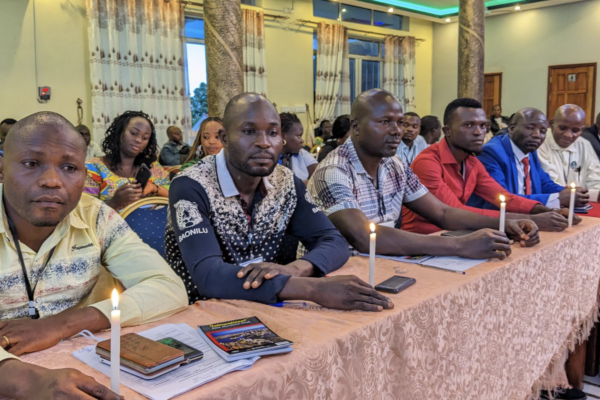UN Secretary-General message on the occasion of the International Day of Peace, celebrating 10th Anniversary of Geneva PeaceTalks
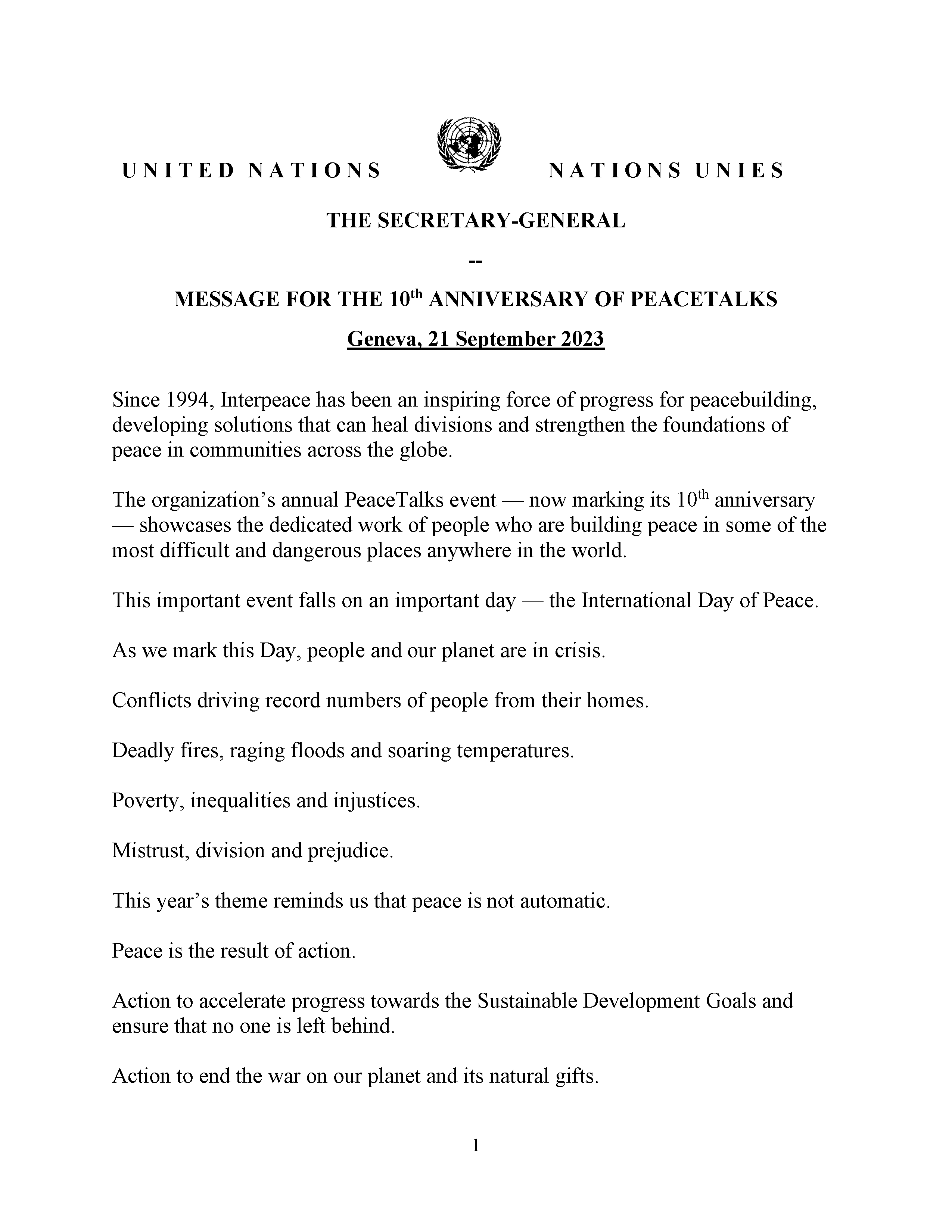
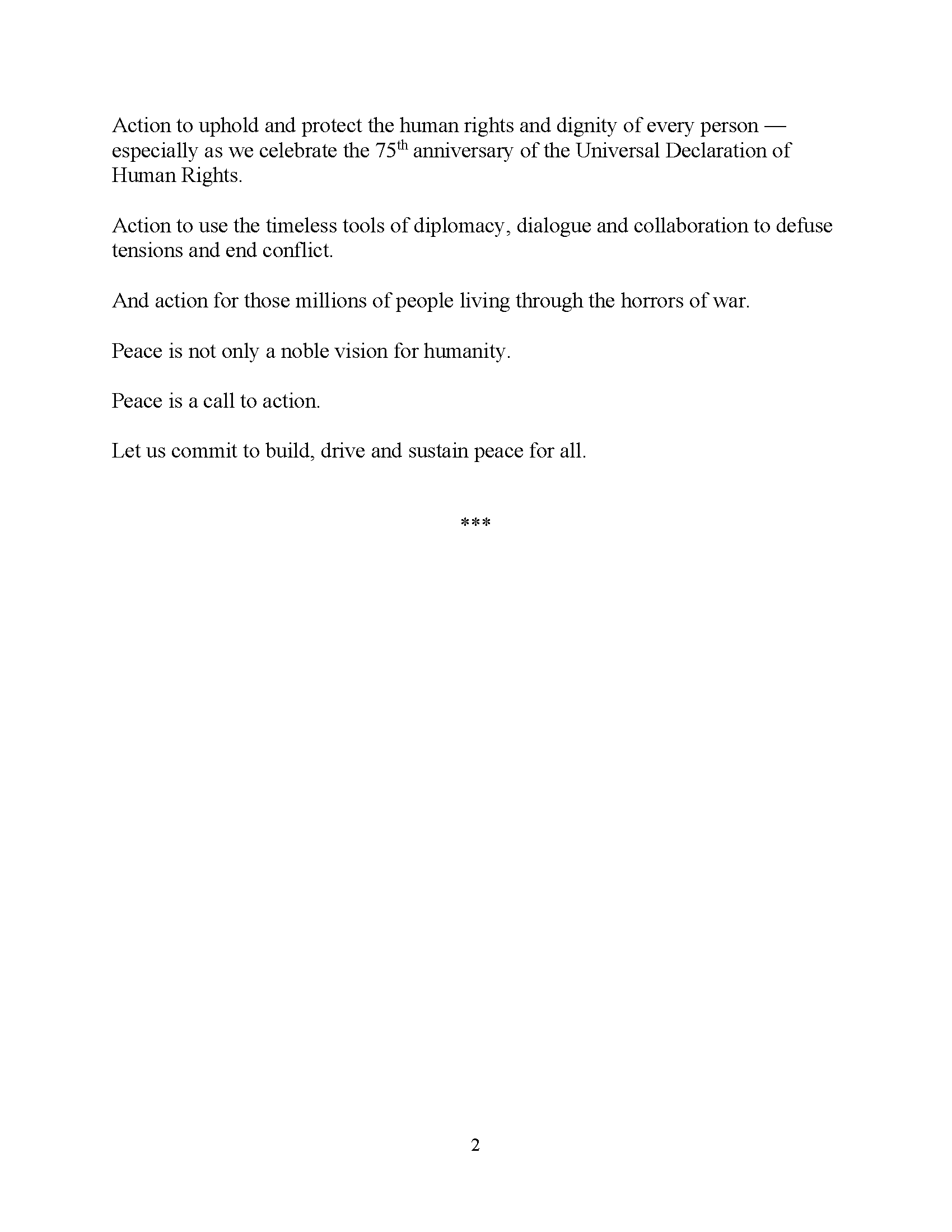


How to work for peace? Around the world, dozens of conflicts are causing poverty, hunger, displacement, inequality, all while climate change is accelerating. The 2023 edition of the Geneva PeaceTalks wants to reflect on the official United Nations theme for the International Day of Peace, “Actions for Peace: Our Ambition for the Global Goals”. It is a call to action that recognizes our individual and collective responsibility to foster peace, which contributes to the realization of the Sustainable Development Goals (SDGs).
This 11th edition of the PeaceTalks will take place on the occasion of the International Day of Peace, September 21, 2023, at the Palais des Nations in Geneva, which coincides with the SDG Summit, marking the mid-point milestone in implementing the SDGs. A hybrid event, the meeting will welcome an in-person audience and will be broadcast live online.
Speakers from different backgrounds will bring their points of view and explain their actions for peace through a series of inspiring talks:
Through short 8 minute talks, speakers will share their vision and stories of peace with audiences from around the world. This will be the 11th edition of the Geneva PeaceTalks.
Co-founded in 2013, the PeaceTalks is a global platform dedicated to telling and sharing inspirational stories for peace. Harnessing the power of storytelling, the PeaceTalks creates a space encouraging dialogue, reflection and inspiring hope. Videos of previous editions at: www.peacetalks.net
WHO
The Geneva PeaceTalks are co-organized by the United Nations Office at Geneva, Interpeace, the Geneva Peacebuilding Platform, with the support of the Permanent Mission of Switzerland to the UN.
This edition is made possible with the support of the Swiss Confederation, the Canton and City of Geneva, Mirabaud, Geneva Call and Fondation Hirondelle. The Musical Performance by César López is made possible through the Plan for the Promotion of Colombia Abroad of the Ministry of Foreign Affairs of Colombia.
WHEN
The event is scheduled on the International Day of Peace, 21 September 2023, 16:00-18:00. It will be followed by a reception.
WHERE
In-person: Room XVII, Palais des Nations, Geneva.
Livestream online at http://webtv.un.org.
All in-person attendees need to have pre-registered online via the link https://indico.un.org/event/1001797/. For more information, www.peacetalks.net.
CONTACT:
Luvini Ranasinghe, Head of Communications at Interpeace / ranasinghe@interpeace.org / Tel : 079 475 64 95.
Despite conflict and instability, Somalia has made progress in governance, democracy, and state-building. However, amidst these advancements, one critical aspect has lagged- the inclusion of women in these critical processes. Women in southern Somalia's Benadir are progressing in various fields, transforming the socio-economic landscape. However, when it comes to formal governance, women continue to be underrepresented.
The Heritage Institute for Policy Studies (HIPS), as part of the Talo Wadaag II programme, organised two workshops to better understand the challenges faced by resilient women in Benadir when it comes to participating in governance, state-building, and conflict prevention. Talo Wadaag is a joint effort by Interpeace and its partners - the Academy for Peace and Development (APD), the Puntland Development Research Center (PDRC), and the Heritage Institute for Policy Studies (HIPS) - in Somaliland, Puntland, and Benadir. Its aim is to promote citizen-centered peacebuilding and democracy by engaging communities in these critical areas.
The first workshop, held on 23 February 2023 employed a range of participatory approaches. These included drawing exercises that allowed women to depict their perceptions and experiences of good governance, interactive group discussions to facilitate the exchange of ideas, presentations, individual activities, and informal focus group discussions. These methods effectively engaged the participants, providing them with a platform to voice their thoughts and share their experiences, particularly regarding their vision of good governance. The workshop enabled HIPS to gather valuable insights into how women perceive their roles within Somalia's governance and state-building processes.
Dr. Yusuf Sheikh Omar, Director of the Talo Wadaag 2 Project at the Heritage Institute for Policy Studies, emphasised the importance of these insights. “Understanding women’s views on governance is vital as preparations for elections in Benadir are underway. Recognising the significance of women’s involvement is key for improving Benadir’s governance and building an inclusive and enduring future for Somalia,” he stated.
Addressing the challenges that limit women’s political participation and incorporating their perspectives is essential to strengthening the social contract. This ensures that the state-building process contributes to a constructive, peaceful, and prosperous society.
The second workshop, held on 13 June 2023, continued HIPS’s efforts to empower the women of Benadir. It equipped them with conflict prevention skills, strategies for conflict resolution, and the means to promote a culture of peace. Discussions also revolved around the role of media activism in driving societal change.
A female participant appreciated the effort put into teaching skills to create social change. “I leave this training feeling empowered as they tailored it to our needs and interests. I feel empowered to become an agent of change for my community,” she stated.
The workshop marked a momentous stride in empowering the women of Benadir in Mogadishu. It equipped them with essential knowledge and skills, fostering their active engagement in public affairs and promoting constructive societal transformation. The Talo Wadaag programme has initiated discussions with relevant stakeholders, such as the Benadir Regional Administration (BRA) and the Ministry of Interior, Federal Affairs, and Reconciliation (MoIFAR). These discussions have identified entry points to support plans for upcoming democratic processes, such as the Benadir elections.
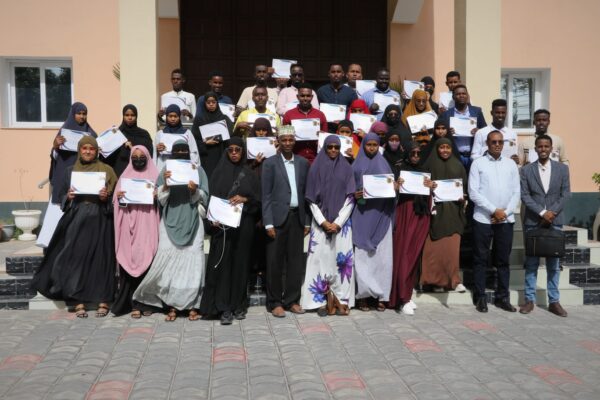
“The skills imparted to the women and the recommendations they provided will be utilised by the Talo Wadaag programme to enhance overall advocacy for increased women’s political participation and representation, especially in Benadir. HIPS and its partner, Interpeace, have already identified entry points to engage relevant stakeholders and contribute to the policy thinking that will govern political processes, such as the vision for elections in Benadir,” affirmed Dr. Yusuf.
“The workshops held by Talo-Wadaag Consortium, led by HIPS exemplify the commitment to contribute towards the creation of an inclusive and equitable governance landscape in Somalia. These initiatives empower women, recognising their vital role in shaping the future of Benadir and the country,” emphasised Interpeace’s Somali Programme Officer, Jesse Kariuki, on the importance of promoting governance skills for women.
TALO-WADAAG 2: Participatory Research Focused on Governance and State building processes in Somalia
Empowering Women in Benadir: The Power of Active Citizenship – Talo-Wadaag 2
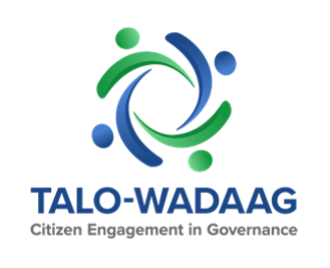
According to the Rwanda Mental Health Survey (RMHS), mental health conditions are significantly prevalent among the youth in Rwanda, with rates ranging from 10.2% to about 20%. The RMHS findings reveal that a significant proportion of Rwandans aged 14 to 25 are struggling with psychological disorders. This statistic emphasises the urgent need for comprehensive mental health support systems that cater specifically to the unique challenges faced by young individuals.
Never Again Rwanda, Interpeace’s local partner in Rwanda implementing the Youth Innovation Lab for Peace (YouthLab) programme, organised an event themed the Amani Youth Expo and Summit focused on addressing mental health and the well-being of young people in Rwanda. The Expo and Summit aimed to raise awareness about the mental health challenges faced by young people in Rwanda and provide a platform for open discussions and innovative solutions.
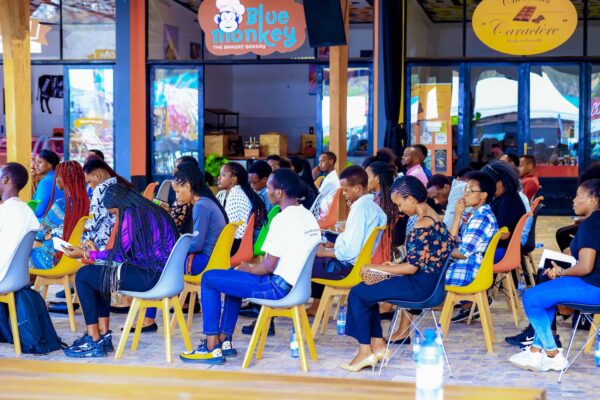
The Amani Youth Expo and Summit served as a catalyst for change under the YouthLab programme spearheaded by the Young Innovators, which is dedicated to addressing youth mental health. Through a series of thought-provoking panel discussions, engaging workshops, and interactive activities, participants were actively encouraged to share their personal experiences and contribute their valuable ideas on how to enhance mental health services and support systems for young Rwandans. The overarching goal was to foster an environment of collaboration and collective action where diverse perspectives could converge to shape effective strategies for improving the mental well-being of the nation's youth.
Mfuranzima Fred, the Managing Director at Imfura Heritage in Rwanda and a Young Innovators representative, emphasised the Youthlab Programme's significance. “Under the YouthLab initiative, we are committed to supporting the well-being of young individuals. I take this opportunity to thank the event partners and donors for their support. Their invaluable contributions have made the programme a reality.”
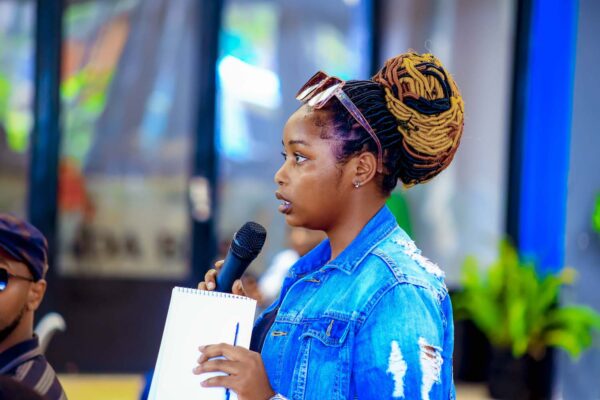
During his opening remarks, Hakomeza Emmanuel, youth intervention senior officer of the Rwanda Biomedical Center, Kigali (RBC), pointed out the significant connection between mental health and youth in Rwanda. “We need to address the mental health challenges faced by young people and put in place comprehensive support systems. These challenges can significantly impact their overall well-being and hinder their ability to thrive academically and socially. By prioritising mental health support, we can ensure that young people have the resources they need to navigate these challenges and lead fulfilling lives.”
The panel discussions led by Derick Ndahiro and the audience's participation offered practical approaches to tackling mental health challenges among youth. The panellists included Jane Abatoni Gatete, a mental health expert; Umuraza Faure Chantal, a passionate mental health advocate and book author; Kabasinga Innocente, a young innovator; and Annick Ishimwe, a dedicated mental health youth advocate. The panellists shared their expertise and personal experiences, providing valuable insights and guidance.
The sessions blended artistic expression with poignant performances, including a theatrical play, compelling thyme poems, and evocative renditions by celebrity musicians. Celebrity musicians such as Papa CYANGWE and B-Threy took the stage, captivating the audience with their heartfelt performances. Comedians Japhet (Bigomba guhinduka) and Rusine Patrick used humour and creativity to convey the importance of young people expressing their pain, seeking help, and feeling free to explore their emotions.
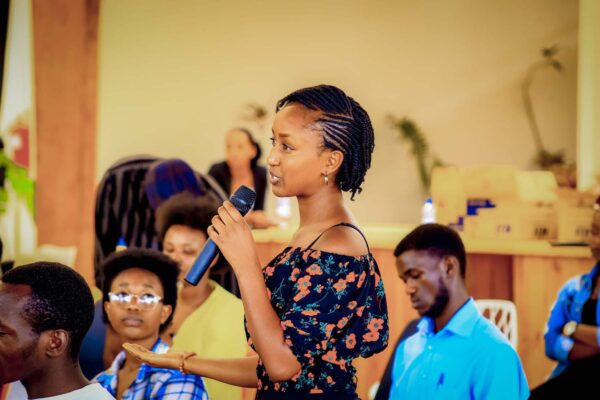
The Expo showcased local NGOs, youth initiatives, and businesses dedicated to mental health advocacy, facilitating networking, and offering a platform for learning and discovering resources essential for nurturing a supportive environment for youth mental health. It emphasised the urgency of prioritising mental health and breaking down stigma, fostering a society where the well-being of young people takes centre stage.
Through the projects “Youth Innovation Lab for Peace (YouthLab)” and “Cross-border Dialogue for Peace in the Great Lakes Region”, funded by the European Union and the Swiss Development Cooperation (SDC), Never Again Rwanda and Interpeace are committed to empowering young minds, spreading mental health awareness, and cultivating an inclusive community.
Uganda is home to one of the world’s youngest populations, with over 78% below the age of 30. Despite this, unaddressed legacies of conflict, along with perceptions of youth as ‘young’ and predisposed to being violent, have impacted (and continue to impact) youth directly and indirectly. Key issues youth face include exclusion from processes that directly impact their lives, justified by culture and their young age, which is often associated with a lack of experience and unfitness to lead, and the limited knowledge youth possess of key policies and frameworks that acknowledge, provide for, and protect their right to participation in leadership, peace, and development processes. As a result, youth are seldom considered partners in various processes despite the presence of policies and laws providing for their engagement, denying them voice, agency, and leadership. This has greatly contributed to the existence of numerous youths with limited skills and knowledge to engage in leadership, peace, and development processes.
Interpeace’s Cross-border Dialogue and Youth Empowerment for Peace in the Great Lakes Region programme aims to promote youth leadership in peacebuilding processes at the regional, national, and local levels in the Democratic Republic of Congo (North Kivu and South Kivu), Rwanda, Burundi, and Uganda by strengthening their capacity through training. The programme is supported by the European Union and the Swiss Development Cooperation and implemented by Interpeace and its local partners, including the Pole Institute, Never Again Rwanda (NAR), the Center of Alert and Prevention Conflicts (CENAP), Action for Peace and Concord (APC), the Refugee Law Project (RLP), and Vision Jeunesse Nouvelle (VJN).
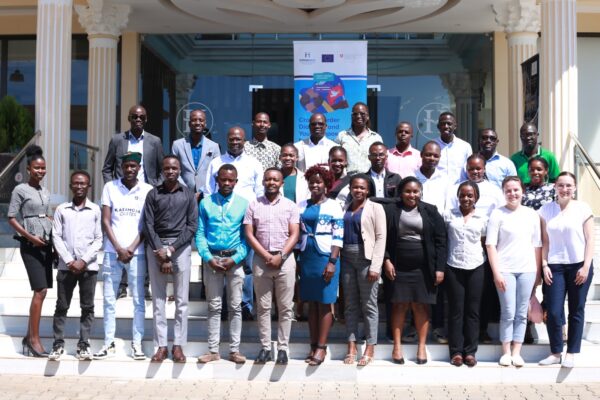
As part of the programme, the Refugee Law Project hosted a week-long training in Entebbe, Uganda, in May 2023. The training was attended by 18 Peace Fellows and five selected youth. The session aimed to improve the participants’ soft skills, such as communication and critical thinking, and technical skills, such as project design and advocacy. Peer-to-peer learning was encouraged to foster interaction and networking. Trainers included Refugee Law Project members, Interpeace-trained Trainer of Trainers (ToT), mentors in Uganda, practitioners from partner institutions, and some of the Peace Fellows themselves who co-facilitated the sessions. The in-person training provided a secure platform for civic discourse, networking, and knowledge exchange. It empowered youth to design and implement their peacebuilding initiatives, deepen their understanding of peace concepts, and enhance communication skills. One Young Peace Fellow had this to say (while appreciating the module on Effective Communication), "…for me, the 7 Cs of communication have been an eye opener; this was very important for me as I realised this is a skill I need for my everyday communication, and I am learning about all this outside school while at the university."
Nelson Mandela was right in recognising education as the most powerful weapon one can use to change the world. Empowering youth as contributors to peace facilitates meaningful partnerships and decision-making in their communities. Mentorship complements formal training by encouraging self-discovery and growth. With collective efforts, including mentorship, we empower youth, for whom half the victory is being prepared.
In Ituri province in the northeast of the Democratic Republic of the Congo (DRC), young people have taken a significant step towards eradicating identity stereotypes and promoting peace. Last July, hundreds of young people took part in the election of the new committee of the Provincial Youth Council in the town of Bunia. The election was organised as a recommendation from a youth dialogue session held in June 2023, supported by the mediation consortium consisting of the NGO’s Interpeace, Action pour la paix et la concorde and Pole Institute, as well as New York University, with funding from the European Union.
To the applause of the assembly, Bungamuzi Kukwabo Déogratias was elected president with 18 votes out of 37. First among the four candidates in the running, he believes that the task to have young people involved in peacebuilding is now easy following a dialogue session to bring together young people from all the region’s communities. “This dialogue was a real opportunity to bring together the perpetrators and victims of insecurity. At the same time, it was easy to identify young members of certain armed groups”, he acknowledged. For him, the impact of these meetings is already visible. “The members of the committee I’m to head after our installation in a few days’ time by the provincial governor are young people from almost every community in Ituri”, he said.
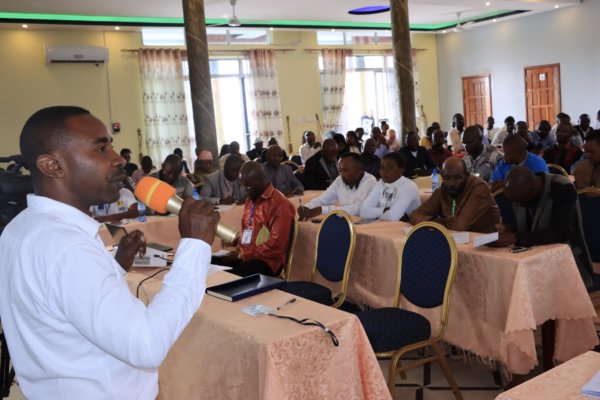
The aim was to get young people involved in the peacebuilding process in this part of the country. And it's done! They have committed themselves to changing the situation by agreeing to put an end to the leadership crisis within their provincial council. "One or two weeks ago, I went on a mission to Kasenyi on the shores of Lake Albert. I was amazed to find young people from different entities using the same means of transport to take part in an activity organised for them. It was almost impossible before these meetings to see, for example, a young person from Bahema-Boga taking a young person from Walendu Bindi on board his motorcycle", enthuses the new youth president.
At the close of the three-day meeting in Bunia, Steve Sengida, deputy director of the cabinet in charge of the economy and finance, was already clear on behalf of the governor. "We must be ashamed of our province's lagging development. The time has come to turn our backs on manipulators. The recalcitrants will only face justice or neutralization", he insisted.
For the president of the Bedu Ezekere local youth council in Djugu territory, this is the first time that young people have been specifically called upon to take part in this kind of activity. "I think peace must continue. I thank the organizers", said Lotsima Dhembu Kabose.
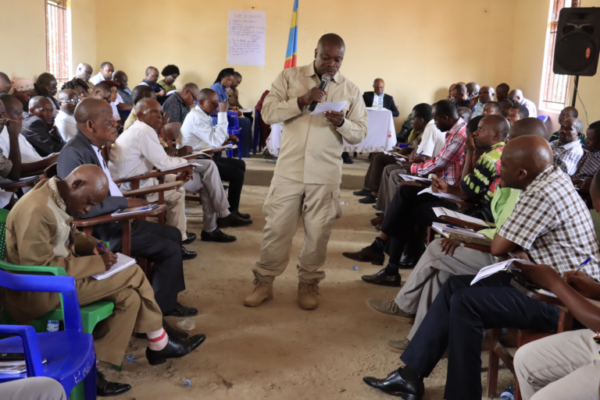

At the end of the meeting, young people from all the structures in the five territories of Ituri province signed an act of commitment, following a plan of concrete actions in the peace process. To mark their support for the peace process, their representatives even lit "candles" as a "light of peace".
"Peace is a struggle for all of us", said one of the participants. During the proceedings, the elements of cohesion between young people from different communities were discussed. The aim was to identify factors of division and cohesion, and concrete actions to be taken by these people, men and women alike.
"We, as young people, are the authors of and responsible for any problem that the province of Ituri is going through. We must first become aware of the situation, and then return to responsibility in order to disassociate ourselves from anti-values", said the president of the Mahagi territorial youth council, Unyuthfwa Nyangambe Jean Claude.
At the invitation of by Interpeace in collaboration with the provincial government, the provincial coordination of the Disarmament, Demobilization, Community Rehabilitation and Stabilisation Programme (P-DDRCS) and the Mediation Advisory Group (MAG), over 400 young people took part in the meeting. They were joined by a number of provincial deputies, members of religious denominations and other local, national and international NGOs. This activity is part of the "Support for meditation and resilience for peace in Ituri and Greater North Kivu" project.
